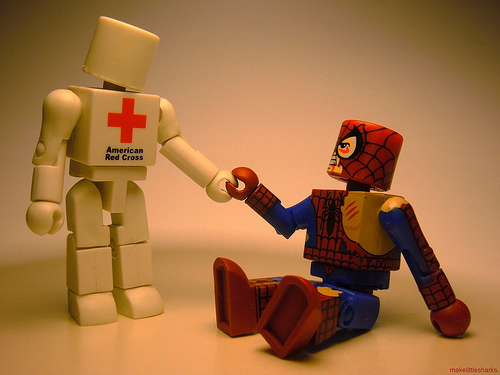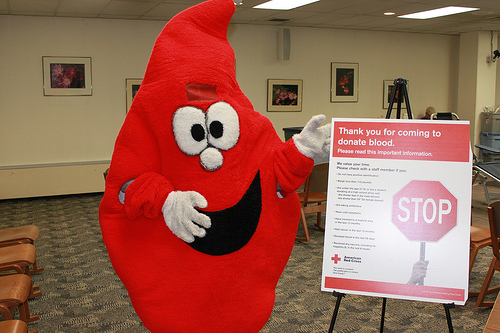
One heartening development that came in the wake of Orlando’s tragedy was the massive show of support responding to the call for blood donations for the wounded. During the day on Sunday, people waited for hours in long lines for the chance to help by giving blood. The website of Florida’s blood donation network, OneBlood, crashed because of all the traffic. OneBlood spokeswoman Stephanie Zaurin said that donations were coming in at “record numbers.” By Sunday night, many of the city’s blood banks were at capacity. Some even had to turn would-be donors away. OneBlood did ask donors to return on Monday and Tuesday, as the shooting victims’ need for transfusions would continue.
And yet, so many LGBTQ people are barred from donating blood to help the trans and queer Latinx people wounded in this attack—our own community members.
Recent social and mainstream media outrage on the subject has mostly focused on the U.S. Food and Drug Administration ban against men who have sex with men as donors. Since 1986, the FDA had maintained a de facto lifetime blood donation ban against any man who’d had sex with a man in the past ten years. The restriction was formalized as a lifetime ban against all MSM (men who have sex with men) donors in 1992. The American Medical Association called for an end to this restriction in 2013, citing discrimination and its lack of a sound medical basis.
In December 2015, the FDA amended its policy slightly. The new rule allows self-identified gay and bisexual men to give blood as long as they haven’t had sexual contact with another man in the past year. The FDA’s stricture now mimics that of many homophobic religious organizations such as the Mormon and Catholic churches: queer men are only acceptable so long as they are celibate.
NPR’s Hansi Lo Wong reported that some Orlando blood banks disallowed even self-identified queer men who’d been sexually inactive for a year or more from donating blood, refusing to adhere to the new policy.
In contrast, the city commissioner of Orlando’s fourth district, Patty Sheehan, stated on MSNBC that she thought blood banks were taking donations from gay men. This began a spate of hopeful rumors that the policy against sexually active queer men had been temporarily lifted in light of the demand for transfusions. OneBlood claimed later on Twitter that they were complying with all FDA guidelines, and corrected misinformation on social media that these policies were not in effect.
But the FDA also forbids many other groups of trans and queer people besides MSM from donating blood, including us sex workers. The current guidelines “defer indefinitely an individual who has ever had sex for money or drugs.”
Many LGBTQ people are in the sex trade for lack of other options, because of rejection from their families and discrimination in employment and education. LGBTQ homeless youth are seven times more likely than their heterosexual peers to engage in survival sex work. The 2011 National Transgender Discrimination Survey, the largest reported survey of trans people to date, found that 11 percent of respondents had done sex work at some point in their lives. Black and Black-multiracial respondents reported the highest rate of sex work participation at 39.9 percent, followed by Latinx respondents at 32.2 percent. And trans women were twice as likely as their trans male peers to have been involved in the sex trade.
So when the FDA bars anyone who’s done full-service sex work from giving blood, they’re discriminating against a large segment of the trans and queer community—especially those of us who are most marginalized within that community.

Trans people in general are affected by FDA blood donor policies as well.
Under the previous policy, trans women who were sexually active with men or other trans women were often misgendered by blood banks as MSM, so they were also barred from giving blood.
The FDA’s December 2015 revised recommendations do include a section addressing how the guidelines affect transgender people, but it merely states that trans people “should be self-identified and self-reported.” But FDA spokesperson Tara Goodin clarified the agency’s vague prescriptions on the topic to Buzzfeed in January 2015, telling the media outlet, “Our policy is to designate sex by birth. That’s all there is to it.” So the guidelines continues to misgender trans women and discriminate against them.
The same interview demonstrated that the FDA seems to have no idea what its policy on trans men actually is. When asked about them, Goodin replied that “…the FDA cannot generally respond to hypothetical situations.” As though no trans man has ever wanted to give blood in reality.
Current FDA policy also indefinitely defers anyone who’s injected unprescribed drugs from giving blood. This cuts another large swathe through the trans and queer community. The rate of injection drug use among LGBTQ people is particularly high—perhaps because these drugs serve as a coping mechanism for people dealing with the constant stressors of systemic transmisogyny, homophobia, and transphobia.
Even the sexual partners of many of these marginalized people within the LGBTQ community are banned from blood donation: women who sleep with men who’ve had queer sex in the past year are deferred from giving blood for 12 months. So are people who’ve had sex with current or former injection drug users or sex workers. Factor in all the people in the LGBTQ community included in those categories and the number of trans and queer people affected by blood donation bans increases substantially.
I personally can count three separate aspects of the guidelines listed above barring me from giving blood right now. How many of these recommendations apply to each of our LGBTQ readers?
Most of these FDA policies date back to the incipient AIDS hysteria of the 80s when the virus was ignorantly viewed as a gay disease or a disease for junkies. In this era, though, these guidelines no longer make medical and scientific sense. For example, Black straight women are now one of the largest growing groups newly infected with HIV.
And the FDA’s recommendations stereotype by group rather than taking individual behavior into account. If you’re already screening individuals before they donate, why not ask them if they use clean needles every time they use injection drugs? If they’re self-identified, sexually active queer men and/or former or current sex workers, why not ask if they’re on PrEP or consistently using condoms?
And if they’re trans women, why erroneously assume they’re prone to the same risk factors as MSM, despite the acknowledged dearth of medical data on the issue?
Every unit of American blood donated goes through 13 tests before being used for transfusions, 10 of which are for infectious diseases including HIV and Hepatitis C. The National Institute of Health finds that advances in donor education and testing have lowered HIV transmission risk from transfusion from 1 in 1.5 million to 1 in 2 million blood units. All donated blood is also subject to a rigorous RNA test which essentially detects HIV at the time of infection.
The American public is not endangered by our trans and queer blood. But people in desperate medical need, like the victims of the Pulse nightclub shooting, can be hurt by the fact that blood banks turn so many perfectly healthy donors away. The FDA’s discrimination against so many groups of LGBTQ people is simply one end of a spectrum of transmisogyny, homophobia, and transphobia which culminates in the murderous hatred of the Orlando shooter.

A clear cogent explanation of a hidden source of discrimination. Thank you.
Thank you for writing this! I’ve been seething for two days about the unfairness.
Since the Orlando shooting I’ve been reading as much as I can on this issue & I’ve now changed my position & support the safety measures in place regarding the ban. As I understand it, many newly infected people with hiv return a negative result. That’s quite a risk your advocating for. People of All ages, in All stages of health & disease receive these blood products.
There are sound reasons why ‘at risk’ demographics are identified to maintain best practice.
You are advocating extending ‘Your’ rights no matter what the risk or cost to another :/
“As I understand it, many newly infected people with hiv return a negative result. That’s quite a risk your advocating for.”
Since new HIV infections are also found in many people from groups currently “allowed” to donate blood (straight black women being the fastest growing group), if your understanding was the whole picture, blood transfusions would be extremely risky & dangerous. If we couldn’t test for new HIV infections in donated blood, then HIV infection from blood transfusions would be a lot higher than 1 in 2 million blood units.
The article you’re commenting on explains that “All donated blood is also subject to a rigorous RNA test which essentially detects HIV at the time of infection.” So it sounds like your reading on the subject may have been incomplete.
The author seems to be arguing merely that we be considered as individuals, with individual risk factors. For instance, I’m a cisgendered woman who’s exchanged sex for money & gifts, but my clients were also cis women, making my overall risk of having HIV relatively low, despite my automatic lifetime ban from donating blood.